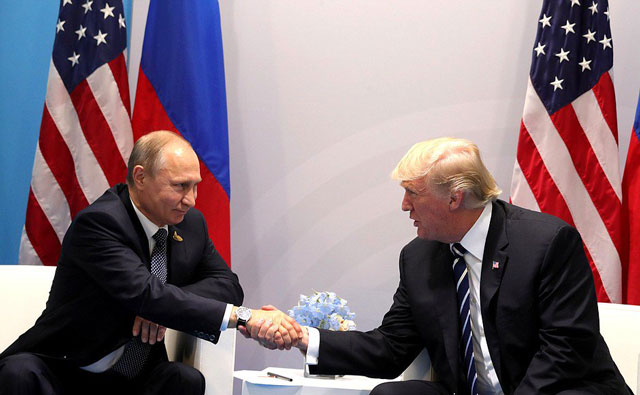
Buenos Aires, Argentina | AFP | US President Donald Trump headed to Argentina Thursday for a fractious weekend of G20 summitry, cancelling planned talks with the Russian leader and boasting that his trade war with China was paying off.
Rumblings of resistance to Trump’s assault on the international order were apparent as French President Emmanuel Macron said he would convene his fellow European leaders in Buenos Aires to forge a united front on “all the challenges” faced at the G20.
Trump called off Saturday’s bilateral with President Vladimir Putin at the G20, minutes after saying it would “probably” still happen despite Russia’s seizure of three Ukrainian ships.
“Based on the fact that the ships and sailors have not been returned to Ukraine from Russia, I have decided it would be best for all parties concerned to cancel my previously scheduled meeting in Argentina with President Vladimir Putin,” he tweeted.
“I look forward to a meaningful Summit again as soon as this situation is resolved!” Trump added, shortly after taking off aboard Air Force for the two-day meeting starting Friday.
Ukraine’s President Petro Poroshenko retweeted Trump’s change of mind and added his own comment in English: “This is how great leaders act!”
The cancellation coincided with a new eruption in the controversy over whether Putin’s government meddled to help elect Trump to the White House.
Trump again ridiculed probes into the allegations and accused his former lawyer Michael Cohen of lying, after Cohen pled guilty to misleading Congress.
In Moscow, Kremlin spokesman Dmitry Peskov had said prior to Trump’s Twitter announcement that even if it may be “impossible” to agree on all issues, “we need to talk” for the sake of global stability.
Reacting afterwards, Peskov said Russia had not been informed formally by the White House.
“If that is the case, the president (Putin) will have a few extra hours in his program for useful meetings on the sidelines of the summit.”
– Art of the deal –
While the Putin meeting now appears off, Trump is still slated to sit down with President Xi Jinping on the G20 margins to press for wholesale reform of the world’s second-biggest economy in favor of access for US companies.
After heaping huge tariffs on Chinese goods, and threatening more to come in January, Trump said a ceasefire to the trade war was “very close” — but cast doubt on whether he even wanted one.
“I think China wants to make a deal. I am open to making a deal but frankly I like the deal that we have right now,” the president said.
Referring to the China tariffs, he said: “What we have right now is billions and billions of dollars coming into the United States in the form of taxes.”
However, economists and critics of the president’s trade policies point out duties are paid by importers and thus constitute a tax on US industry and consumers that is not paid by China.
En route to Argentina, Xi vowed on Wednesday that China would “make a lot of efforts to speed up market access, improve the investment environment and increase protection of intellectual property.”
But foreign firms in China complain that such promises are all too routine, and analysts doubt that Trump and Xi’s talks over a working dinner will serve up much beyond a commitment to negotiate further.
– ‘Disastrous’ –
Trump’s tough talking set the stage for a contentious gathering in Argentina with the tensions over Ukraine and trade deepening fissures carved open by the US president on climate change — an issue that nearly torpedoed last year’s G20.
It is likely to be to the fore of the meeting of European leaders called by Macron, along with demands to resist the trade protectionism now stalking the world economy 10 years after the first G20 summit was held in the throes of financial crisis.
In an interview with Argentine daily La Nacion, the French president warned against the risk of “a destructive trade war for all” emanating from the G20 discussions.
“If we do not show concrete progress, our international meetings become useless and even counterproductive,” he said.
Trump has repeatedly shown his disdain for international summitry by blocking final communiques at other recent gatherings such as the G7 and the Asia-Pacific bloc APEC.
G20 sources said climate change was emerging as the biggest stumbling block to agreement on a communique in Buenos Aires.
Trump now has an ally on that issue in Brazil’s incoming, far-right president Jair Bolsonaro, their skepticism defying scientists’ increasingly urgent warnings that the planetary threat is real and needs policy redress now.
G20 countries account for four-fifths of the world’s economic output but the group’s consensus on the biggest challenges is under assault as other members such as Italy and Mexico also fall under the sway of populist governments.
The G20 summit is already confronted with dire warnings, by the International Monetary Fund among others, of the potential harm faced by the world economy from Trump’s tariffs on Chinese goods and his stated threats of action to come against European and Japanese cars.
Thomas Bernes, a former official in Canada’s finance ministry now at the Centre for International Governance Innovation, said Trump’s penchant to “create chaos and then cut a deal” risked devastating consequences.
“Equally we could have Trump just walking away, increasing tariffs on Chinese products and throwing the whole world into a trade war, which would be disastrous for the entire world,” he told AFP.
 The Independent Uganda: You get the Truth we Pay the Price
The Independent Uganda: You get the Truth we Pay the Price





